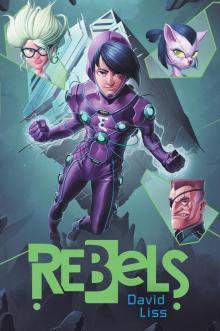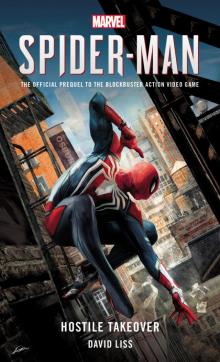- Home
- David Liss
Marvel's SPIDER-MAN Page 3
Marvel's SPIDER-MAN Read online
Page 3
“Tell me how I can help,” he said.
“Why did your voice suddenly get so deep?”
“It didn’t.”
“It did, and it still is. Before you sounded like a kid—”
“Hey!”
“—and now you sound like a kid trying to fool someone over the phone.”
“How about less criticism and more crime-solving?” he proposed. A wry little smile flickered across Lieutenant Watanabe’s lips. Then she was back to business.
“You see that trailer down there?”
She pointed to a white metal rectangle about 200 feet past where the other plainclothes cop was still sipping his coffee. He was also looking at his phone, and from this distance Peter couldn’t be sure, but it looked like he was playing some kind of jewel-matching game.
“That’s the terminal’s security office,” she said. “The door is on the far side, so if you can meet me there without anyone seeing you, I’d like to show you something. Give me five minutes.”
Then she was gone.
* * *
GETTING to the entrance was no problem. A little creative swinging, and he was through the door. Lieutenant Watanabe was seated at a desk, running her fingers along a keyboard. It was gloomy, but a half-dozen video monitors illuminated her face, each showing a different section of the facility. The trailer smelled of old gym clothes.
Watanabe turned the moment he entered, and her hand moved toward her gun, not quite touching it. She might be willing to work with him—she might even trust him on principle—but she wasn’t about to let her guard down. Peter didn’t like her any less for it. It was common sense.
“I told everyone I needed to concentrate in here, so we have a few minutes,” she began without any preamble. “But we don’t have all the time in the world, so save your comments and questions for the end.”
Her fingers danced across the keyboard. One of the monitors went dark, then began playing a recording. The first thing she showed him was a black-and-white clip revealing his first encounter with Andy. A time signature spun rapidly in the lower left corner. It was always weird watching footage of himself. There was a part of his mind that never quite got used to seeing himself from the outside.
“When I left he was fine,” Spider-Man said. The footage backed him up.
“Quiet,” she said, forwarding the footage for what looked like only a few minutes. It showed Andy walking away from the dock, trying to keep to the shadows, probably mindful of the security cameras. Then Spider-Man leapt in behind him, landing lightly on his feet—so lightly that Andy seemed not to notice.
Definitely not how things happened…
He knew that move. Knew how to land from thirty or forty feet up, without making a noise. He did it all the time to get a drop on the bad guys. It had taken him months to learn the trick back when he first started out. Now it was second nature.
The problem was, that wasn’t him. Was it? The moves were right—so much so, he had to remind himself that it was impossible. He looked at the time signature. By that point he was well on his way to the construction site.
Holy crap! It has to be the guy. The imposter.
He was about to open his mouth to say something when the Spider-Man imposter raised his right hand. He held a gun. It looked absurd and strange and grotesque. Spider-Man never touched a gun, unless it was to get it away from some idiot who had one. Even then, he usually used his webs. Guns were big and loud and nasty. They were difficult to nuance and frequently deadly. They were everything he didn’t want to be.
The imposter must have said something, because Andy jumped, his shoulders lurching upward and his legs wobbling in mid-stride. He turned, and then started to backpedal. There was the burst of muzzle flash, a violent eruption of light that obscured everything else in the dark frame. When the light cleared, Andy lay on the ground.
The imposter took a moment to examine the body, then he fired three more shots into the prone figure. He paused for another instant, and then shifted his gaze to look—at the security camera. At least, it seemed like he did. It was hard to tell with the mask. He then raised his left hand, a web shot out, and he propelled himself out of the camera’s field of view.
* * *
SPIDER-MAN needed time to gather his thoughts.
There were a hundred things he wanted to say, and he didn’t even know yet what half of them might be. Ideas burst into his mind, only to be replaced by others. Outrage, pity, indignation—raw emotions had the advantage here, but there were other things. Observations of minor details that some distant, calmer part of his mind knew might be of use to the detective.
It was hard to stick to logic, though. Andy had died facing an impersonator. He’d died believing that Spider-Man had gunned him down. It didn’t make the crime any worse, but it made him all the more determined to do something about it.
“I didn’t do that,” he said. “I would never do anything like that.”
“It’s inconsistent with your past behavior,” Watanabe replied in a clinical tone, “and it would be hard to prove that one person wearing a mask is the same as another person wearing the same mask. The perp moves a whole lot like you do, though, and that’s harder to mimic. If you have an alibi, it would help us. Maybe there’s another place you might be on camera at the same time? Though, again, we still have the mask and identity problem.”
“First of all, that’s not me.” His thoughts began to shift into focus—at least some of them. “I don’t use guns, and I absolutely don’t go around assassinating people. Even the Daily Bugle, back when Jameson was calling for my head, never claimed I would do that.”
“I believe you,” Watanabe said, replaying the footage, “but my opinion doesn’t count as evidence.”
Spider-Man leaned in closer to the screen, peering at the costumed figure who appeared there. “Freeze it,” he said. “There. The suit isn’t quite right. It’s close. It’s a decent copy, definitely better than something you’d get from a costume shop, but the design is a little off. I can’t say anything about the color, but the spider icon doesn’t look exactly like mine, and the web lines are too close together.”
“I noticed that, too,” Lieutenant Watanabe said. “Here, look at the earlier footage.” She brought it up on another screen. “You would’ve had to change your outfit into something nearly identical, and then come right back. It doesn’t make sense, but whenever we’re dealing with costumed vigilantes, ‘making sense’ doesn’t always apply…” She let her voice trail off in a way that indicated she was playing devil’s advocate, and not actually arguing a position she believed.
Spider-Man took a deep breath, organizing his thoughts. He needed to tell her everything that had happened, and had to figure out what would be most useful. She pulled out her cell phone and he began, describing his encounter with Andy, getting the tip about the construction site. He went through everything that happened there, as well.
“It sounds awfully convenient,” she said tonelessly as she typed. “A guy who can copy your moves just happens to show up, the same night Spider-Man is filmed killing a kid.” She shook her head. “Like I said, things with your crowd don’t always make sense, but this feels like a setup. The disposable henchmen were there to slow you down while the real bad guy changed his clothes and hightailed it over there to face you.”
It sounded plausible, but there were still a lot of unanswered questions.
“Why change his clothes at all?”
“Maybe because he wanted you to see this?” she said with a shrug. “Probably figured you’d catch it on the news, rather than here with a cop, but I think the shooter wanted this video to be a gut punch. Someone is calling you out. I’d ask if you have any enemies, but that’s a stupid question.”
“If the construction site has video cameras, and most of them do, then it will at least prove that part of my story.”
“I’m thinking the same thing,” she said. “You got an address?”
He told her abo
ut the building, and Lieutenant Watanabe’s eyes went wide. She set down her phone and turned to look at him.
“Are you kidding me? You’re sure that’s the location?”
“Yeah,” he said. “Why?”
She let out a long breath that hissed between clenched teeth. “It’s hidden behind hundreds of pages of documents and a half-dozen shell companies, but that construction site is owned by Wilson Fisk.” She worked her mouth as if she was trying to get rid of a bad taste. “The frigging Kingpin of Crime.”
FISK, he thought. The anger blossomed inside him, radiating outward until it was hard to remain still.
Fisk was in the news a lot. Back when he’d first started Spider-Manning, Peter had been convinced Fisk was—as the tabloids claimed—the Kingpin of Crime, the most ruthless criminal in the city. Sure, Peter was just a high-school kid back then, but he’d been driven to prove that he could use his powers responsibly.
He’d made a massive mistake, soon after he got his spider-powers—a frivolous decision not to act when he might have acted, should have acted, and that had led to the death of his Uncle Ben. He’d sworn never again to sit idly when there was something he could do. Something that would make a difference.
That something had been putting the Kingpin behind bars. Spider-Man had dedicated months of his life toward that one goal—disrupting Fisk’s operations, keeping him off his game, and looking for hard evidence upon which even a bribed or blackmailed district attorney would have to act.
Spider-Man had dug up that proof. He’d collected files, laptops, photographs, and witnesses. He’d found enough hard evidence to put Fisk in a bespoke orange jumpsuit for life.
Back then, it felt like the triumph of a lifetime. He remembered sitting on the couch with Aunt May, shoving fists full of popcorn into his mouth while the local news showed Fisk perp-walking into the precinct.
“You know, Peter, there was a time when I wasn’t sure how to feel about that Spider-Man,” Aunt May had told him, “but it certainly looks as if he’s done the city a real favor.” Coming from her, it had felt really good. That cocktail of pride and satisfaction and contentment—the sensation of knowing he’d really accomplished something important—had been hard to beat.
Then life beat it. Life beat it right down, and smacked it upside its metaphorical head.
Fisk’s lawyers went to work, and suddenly half the news outlets in the city were on Fisk’s side. “It was a setup,” they said. Spider-Man was a thug, a criminal himself, and he wanted honest businessmen like Wilson Fisk destroyed so the criminals could have free rein. Evidence went missing. Documents vanished or changed. Photos were altered. Computer records disappeared. Witnesses “forgot” things or remembered entirely new accounts that exonerated Fisk, made him look innocent, made him look like a hero, struggling to save his business while a lawless vandal in a costume tried to tear down everything an honest man had accomplished.
Fisk walked.
He’d gone right out of the courthouse, and then out of the country. He’d been gone for years, too, and maybe that was good enough, Spider-Man had told himself. Sure, it wasn’t perfect. No one wanted a guy like Fisk being evil on someone else’s turf, but at least Spider-Man had cleaned up his own backyard. If people everywhere did the same, the bad guys would have nowhere to hide.
It was weak, Spider-Man knew, but it was all he had.
Then, a year ago, Fisk appeared back on the scene, throwing money around, investing in prominent real estate deals, developing long-neglected parts of the city, creating jobs and goodwill. The newspapers were full of stories about the Fisk Foundation, a new charitable effort which was aimed at promoting opportunities for New Yorkers of all incomes. Wilson Fisk was a changed man, he told anyone who would listen, which included a number of journalists whose organizations were flush with Fisk money. He’d never been what the vigilantes had claimed, he told them, but he had been selfish and greedy, focused on nothing but his own bottom line.
Hardship had taught him the price of selfishness. Now he understood that he had to do good to do well, and that was why every project he invested in would make the city a little better, improve the lives of its citizens. He didn’t want to profit unless others profited, too.
That was what he claimed, and that was what plenty of people seemed to believe. The truth was, Fisk was back in drugs and extortion and hijacking and money-laundering. All of his old tricks. If it was dirty and violent and profitable, he had his hands in it. Spider-Man knew it, and he was sure he could prove it, but he didn’t know if proving it would change a thing. It hadn’t last time.
* * *
“I know you’ve got your own history with that piece of garbage,” Watanabe said. “That’s one of the reasons I’m giving you the benefit of the doubt. I’ve been trying to build a case against Fisk since he came back on the scene, but I’ve had to do it on the sly. There are plenty of people above me who don’t want Fisk investigated.”
“Fisk always had cops on his payroll.”
“Allegedly,” Watanabe said, but her tone made it clear there was no doubt. “Those charges were dropped, remember. You played a pretty big part in his arrest that time. What was that—five years ago?”
“Seven,” Spider-Man said.
“Right,” she said. “I guess the question is, what is Fisk after now? Why go to all this trouble? What does setting you up get him?”
“Seems like it’s better to focus on catching this impersonator,” Spider-Man proposed. “Fisk is slippery, and we can worry about his motives later. This bogus Spider-Man—bogus me—might provide all of the answers. Can you ask for the video-camera feed from the construction site?”
“We can ask,” she said, “but if they say no, we’ll need a search warrant, and without any evidence of a crime but your word, I don’t see that happening. Even if we could get a warrant, it’ll take time. Fisk might have his people erase or alter the feed by then.”
“Why would Fisk even have a secret construction site?” Spider-Man asked. “Everyone knows he’s a real estate developer.”
“This building is nothing but high-end luxury co-ops,” Watanabe explained. “There’s nothing noble about it—nothing that benefits the ‘common man.’ It’s meant to make a ton of money, so he doesn’t want it getting out, since it’s not consistent with his new ‘good-guy’ con.”
“None of this tells us what he wants.”
“It looks like good old-fashioned revenge to me,” Watanabe said. “You messed with him. Now he’s messing with you. You really put the hurt on him back in the day. You gathered a ton of good evidence, but Fisk’s lawyers were able to kick up plenty of reasonable doubt—especially with evidence gathered by a guy dressed like a spider.”
“So there’s no point in going after him again?”
“I didn’t say that,” she replied. “If you’d had someone on the inside helping you out, someone who could clean the evidence the way Fisk launders money, things might’ve turned out differently the first time. I know you costumed types are loners, but maybe we could help each other out.”
This was what he had been waiting to hear. It was a terrific idea, but he didn’t want to appear too anxious. So he leaned back and folded his arms.
“Maybe.”
“I’m usually out of Chinatown, but Hell’s Kitchen is shorthanded tonight,” she said. “That clown out there playing some stupid game on his phone isn’t my regular partner, either.” She gestured with her head, looking disgusted. “In fact, I think he could be one of those guys in Fisk’s pocket, which is why I’m happy to let him play games on his phone instead of helping me out. I caught this case, and that moron will be happy to be off the hook. All of which means I call the shots.
“I’m going to go on the offensive, argue that we suppress the Spider-Man angle. Say the evidence makes it clear—and it does—that this is an imposter looking to stir the pot, and we don’t want to play his game. Sooner or later, the guy will have to strike again.”
; “And someone else gets killed.”
“Maybe, maybe not.” She shrugged. “There’s no reason to think he’ll play the same hand twice. There’s also no reason to think he won’t use violence again, no matter what we do. Our best option is to keep him playing our game, rather than having us play his. Meanwhile, you and me—we go after Fisk.”
“Go after him how?”
“I don’t know,” she admitted. “I need to give this some thought, but you can go places I can’t, and I know things that you don’t. Your abilities should be able to land us evidence I’d never get my hands on otherwise, and I can turn it into something that will hold up in court.” She paused, then added, “Let me chew on this a little while. If you don’t like what I come up with, you can tell me to get lost—but I have a feeling you’d like to see Fisk go down as much as I would.”
She held out her hand.
They shook, and maybe it was just the emotion of the moment, but it felt as if something momentous had just happened.
“Let’s hope we don’t make things worse,” he said.
Watanabe grinned. “I can see you’re going to be a whole lot of fun to work with.”
* * *
IT wasn’t even eleven o’clock yet.
It felt much later, like the sun should be coming up soon. Peter still hadn’t processed everything that had happened. The setup, Andy being murdered, the imposter, and Fisk. It was a bubbling stew of horribleness. The only bright spot was Lieutenant Watanabe. If she was willing to work with him, and to figure out how they could pool their resources, it might be a chance to set things right.
Inside his East Village apartment, Peter navigated the piles of clothes, dirty dishes, stacks of books, and torturously assembled computer components. The place was cramped, badly maintained, and way too expensive. He was behind with last month’s rent, and couldn’t even bring himself to think about this month’s. Living in a shoebox he couldn’t afford was just part of the glamor of being a super hero.

 The Whiskey Rebels
The Whiskey Rebels Renegades
Renegades The Twelfth Enchantment: A Novel
The Twelfth Enchantment: A Novel The Day of Atonement
The Day of Atonement The Devil's Company
The Devil's Company Randoms
Randoms Paleo / The Doomsday Prepper
Paleo / The Doomsday Prepper Rebels
Rebels A Spectacle of Corruption
A Spectacle of Corruption The Twelfth Enchantment
The Twelfth Enchantment The Coffee Trader
The Coffee Trader The Ethical Assassin
The Ethical Assassin The Devil’s Company: A Novel
The Devil’s Company: A Novel The Double Dealer
The Double Dealer The Whiskey Rebel
The Whiskey Rebel A Conspiracy of Paper bw-1
A Conspiracy of Paper bw-1 The Devil's Company bw-3
The Devil's Company bw-3 Marvel's SPIDER-MAN
Marvel's SPIDER-MAN